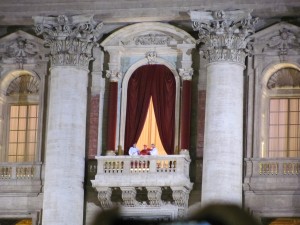On March 13, Cardinal Jorge Bergoglio was elected as the next leader of the Catholic Church. Taking the name Francis, the new Pope greeted thousands of onlookers from the balcony of St. Peter’s Basilica shortly after 8 p.m.
Six UR students, plus Religion and Classics lecturer Nicholas Gresens, witnessed the historic event. Three of the students — juniors Amanda Budreau, Sasha Tharani, and Rachel Beckman — are currently in Rome for semester-long study abroad programs. The other three — seniors Ryan Vogt, Peter Carlile, and myself — were in Rome as part of Gresens’s intensive Latin 220 course, “Epigraphy in Rome.”
Beckman and Budreau had both been present at the Vatican for Pope Benedict’s final public audience before resigning.
“That was cool enough,” Budreau said, “but after what happened [on March 13], it seems like comparing an elementary school’s talent show to a Beyonce concert.”
Tharani had also visited the Vatican several times after Benedict’s resignation, documenting the pilgrims to St. Peter’s as part of a photojournalism project. Her remarkable photos of this transitional period in Catholic history have since been collected in a slideshow available online at The Buzz.
“I will always remember being abroad in Rome and partaking in these historic occurrences,” Tharani wrote. “They have, to some extent, defined my experience in Rome.”
On March 13, at approximately 5 p.m., Vogt, Carlile, and I returned to our hotel after touring the Colosseum.
“We hadn’t decided what we were going to do that night, and [Gresens] suggested we could go wait for the smoke [from the Sistine Chapel chimney] with him, as it was supposed to show in the next half hour or so,” Vogt said. “It was early in the [conclave] process, so we weren’t expecting the cardinals to have reached a decision so soon, but seeing black smoke would still be a cool addition to the trip, so we decided to check it out.”
Around the same time, Beckman and a number of other students from her study abroad program made their way to St. Peter’s Square to join the several thousand spectators already waiting for the smoke amid heavy rain and srong wind. Budreau also headed to the Vatican after getting out of class.
While waiting, Gresens and Carlile were interviewed by Uruguayan journalists and a correspondent from the Boston Globe. The BBC later interviewed Carlile, and Vatican Radio interviewed Gresens.
After spending nearly two hours in the square, the students’ wait was rewarded.
“At first, we weren’t sure if it was white or black smoke,” Carlile said. “The first puff was gray and then turned to white.”
A roar went up from the crowd, and people surged toward the steps of the Basilica, where the new pope would soon appear to salute the crowd.
“At around 7:05 p.m., I was sitting in class when I heard the overwhelming sound of bells,” Tharani said. “To put it honestly, that’s an understatement. Every church bell throughout Rome was ringing.”
To the consternation of her professor, Tharani and her friends grabbed their things, hurried from the classroom, and joined the crowd of people running toward the Vatican.
The crowd became increasingly energetic during the next hour, as roughly 100,000 more people poured into St. Peter’s Square. Chants of “Viva Il Papa” and spontaneous singing of hymns echoed through the plaza. Loud cheering carried from the surrounding streets of Rome.
Eventually, a procession of Swiss Guards entered the plaza, playing military drums and brass and marching in formation up the steps of the Basilica.
Shortly after 8 p.m., a cardinal emerged on the central Basilica balcony and announced in Latin that the new pope was from Buenos Aires and had taken the name Francesco, or Francis in English.
I was standing next to pilgrims from Mexico City and from Argentina, all of whom reacted with tremendous enthusiasm at the news of a Latin American pontiff.
Minutes later, the Basilica curtains were thrown back, and dozens of red-robed Cardinals emerged onto the building’s balconies.
Pope Francis then emerged, flanked by lieutenants and escorted behind a tall crucifix standard.
Speaking in what Budreau described as a “timid voice,” the slightly startled-looking pontiff greeted the crowd in Italian.
“Even though I couldn’t understand exactly what was said, it wasn’t necessary to,” Carlile reflected. “The reaction of the crowd and the feeling they exuded told us all we needed to know about the new pope’s words.”
Pope Francis then asked for the crowd’s prayers and, in an utterly surprising move, bowed to the crowd for over a minute.
“When he asked us to bow our heads, the entire square, which was completely full, was silent,” Burdreau said. “You could hear the sound of the water splashing in the fountains.”
After leading some prayers in Latin, Francis told the crowd to “have a good night and go with God.”
“While we may see more popes elected in our time, the chances of us having this same experience are slim indeed, and I’m glad
I could be a part of it,” Carlile said. “We’ll be telling this one for years.”
Budreau also acknowledged the rarity of such an experience.
“Had Francesco been elected any other time, I wouldn’t have seen it,” she said. “I would have tried to run from any place I may have been, but I probably would have missed it. I am so lucky to have been where I was when I was.”
Gorman is a member of the class of 2014.





